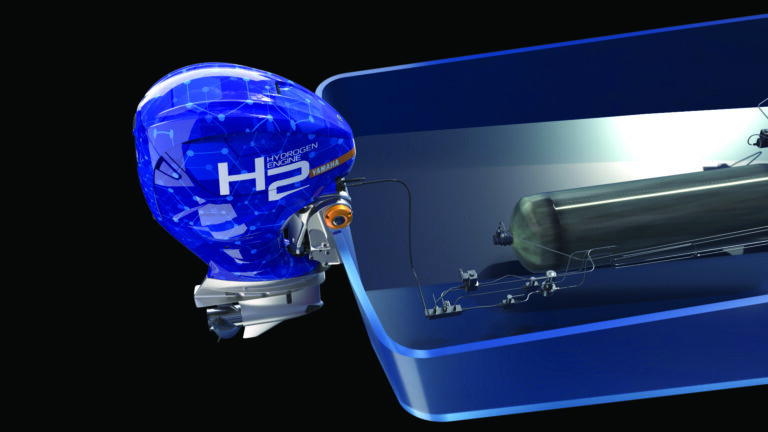Yamaha has developed a hydrogen fuel system in collaboration with Roush and Regulator Marine, unveiling a new hydrogen outboard at February’s Miami International Boat Show. Roush worked on the fuel system to power the new outboard, while Regulator Marine helped build a boat suitable for testing the prototype outboard. The trio has plans to test the prototype for viability on the water in the summer of 2024.
“Yamaha is exploring all possibilities to achieve carbon neutrality,” said Ben Speciale, president of the Yamaha US marine business unit. “We’ve made commitments for our operations to be carbon neutral by 2035 and our products to become carbon neutral by 2050. That goal within the marine market can only be reached through an approach that leverages multiple solutions. We believe hydrogen is a viable method of achieving these goals.”
Matt Van Benschoten, Roush’s vice president of advanced engineering, added, “When you look at Roush’s history with hydrogen, it ranges from land-speed-record vehicles to spacecraft. A lot of that knowledge we’ve acquired over the years we are now applying directly to this Yamaha project. We are the fuel systems integrator, responsible for fuel systems designs, all of the specifications development, physical integration and safety system analysis, as well as testing and development. Yamaha is trying to determine if hydrogen can successfully be used in this market, and I think we will find out the answer is yes.”
Regulator Marine built a hull based on its 26XO and modified to accommodate the hydrogen tanks that power the new outboard.
“Innovation starts by asking questions,” said Joan Maxwell, president of Regulator Marine. “It creates a little angst but at the end of the day, good stuff comes out of innovation. In the future, as we design boats, if this proves what we think it will, it could be very possible that we will be designing hulls around these hydrogen fuel tanks.”
In other sustainable propulsion news, Yamaha recently announced plans to acquire all shares of the electric outboard company Torqeedo and is also continuing to promote the use of sustainable-fuel IC outboard engines as another alternative.



